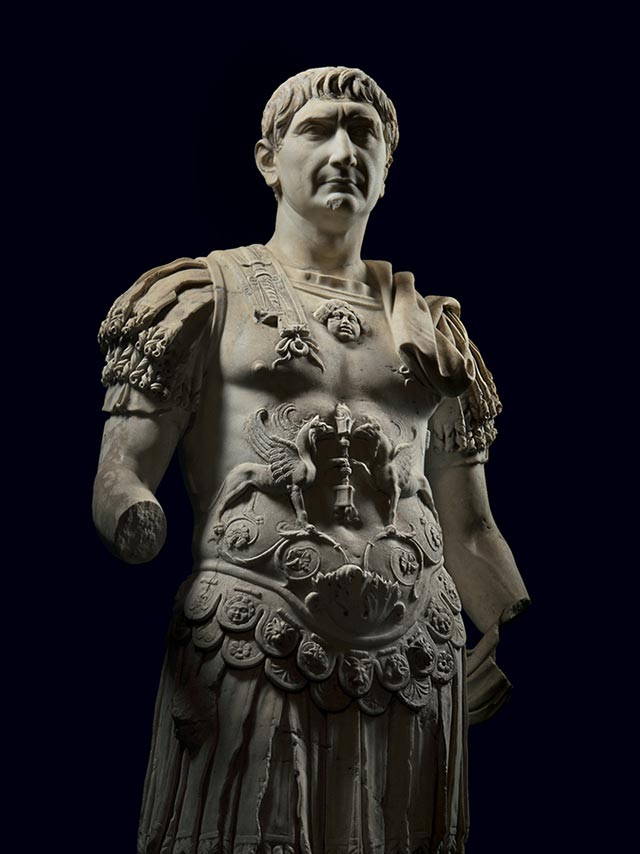
“Use this sword against my enemies, if I give righteous commands, but if I give unrighteous commands, use it against me.” – Roman Emperor Trajan 1
This is a saying widely attributed to the Roman Emperor Trajan, as he appointed his “Master of the Horse” and handed him a sword. It is, by far, one of the most powerful and simplest demonstrations of the doctrine of the lesser magistrate. What this nobilisimus imperator of the known world was saying is that his word was not final. There is a standard of righteousness and unrighteousness that even this sebastokrator had to bow the knee to. He was not, indeed, the Emperor of the world. God is.
The term “doctrine” is not an exclusively theological term. It is ” a particular principle, position, or policy taught or advocated, as of a religion or government”2. And the term “magistrate” refers to ” a civil officer charged with the administration of the law”3. We could change the words to: The principle of the lesser officer (elected or appointed). In and of itself, the term does not explain much. Thankfully, we have countless examples throughout history that help us understand its meaning and significance.
This doctrine can be defined as follows,
“when the superior or higher civil authority makes unjust/immoral laws or decrees, the lesser or lower ranking civil authority has both a right and duty to refuse obedience to that superior authority. If necessary, the lesser authorities even have the right and obligation to actively resist the superior authority”
4.
Thus the significance of this doctrine lies in the fact that all, rich and poor, mighty and weak, powerful and lowly, are under the jurisdiction of divine law. To transgress that law is to be at enmity with God. This is true both on a spiritual and judicial level. Magistrates who transgress divine law are not only breaking the law against their fellow neighbor, but against God himself. Thus, it is impossible to speak of law in any degree apart from an objective standard that transcends culture, time, and the whim of man.
A positive application of this doctrine is that magistrates can (and must) keep the power of higher magistrates in check when they do not hand down righteous decrees. They have a divinely bestowed authority to filter every edict through the lens of divine law. The Syrian governor Publius Petronius, appointed by Roman Emperor Gaius Julius Caesar Augustus Germanicus (better known as Caligula), unbeknownst to the verdict of the future, provides an excellent example of interposition,
“When Petronius defied Caligula, he was performing an act of interposition as a lesser magistrate on behalf of the Jews. To demonstrate his act of interposition, Petronius actually called the Jews to meet with him at Tiberias. When the Jews arrived, they were horrified to see Petronius’ army – two legions – assembled before them. The Jews stood on one side, while the army stood on the other. Petronius stepped between them. He then informed the Jews that this army was assembled under the authority of Emperor Caligula, who had ordered the army to war against and destroy them if resistance was made to having the image placed in the Temple”
5.
This was it. Knowing that they would not give in, the Jews braced for total annihilation. However, Governor Petronius made the following speech,
“’Yet,’ said he, ‘I do not think it just to have such a regard to my own safety and honor, as to refuse to sacrifice them for your preservation, who are so many in number, and endeavor to preserve the regard that is due to your law; which as it hath come down to you from your forefathers, so do you esteem it worthy of your utmost contention to preserve it: nor, with the supreme assistance and power of God, will I be so hardy as to suffer your temple to fall into contempt by the means of the imperial authority. I will, therefore, send to Caius, and let him know what your resolutions are, and will assist your suit as far as I am able, that you may not be exposed to suffer on account of the honest designs you have proposed to yourselves; and may God be your assistant, for his authority is beyond all the contrivance and power of men; and may he procure you the preservation of your ancient laws, and may not he be deprived, though without your consent, of his accustomed honors. But if Caius be irritated, and turn the violence of his rage upon me, I will rather undergo all that danger and that affliction that may come either on my body or my soul, than see so many of you to perish, while you are acting in so excellent a manner. Do you, therefore, every one of you, go your way about your own occupations, and fall to the cultivation of your ground; I will myself send to Rome, and will not refuse to serve you in all things, both by myself and by my friends'”
6.
Even at the risk of his own personal privilege and safety, Petronius entrusted himself and the Jews to God, since “His authority is beyond all the contrivance and power of men,” even that of Caligula’s.
The Bible is replete with examples of interposition. Take, for example, Queen Esther in chapter 8 of the book that bears her name. King Ahasuerus had, by the ill advise of Haman the vizier (an unrighteous magistrate), enacted an irrevocable law against the Jews in his kingdom. Queen Esther, a Jew herself, and a lesser magistrate, stood in the gap between her people and the king, fully aware it could cost her life. For more examples of interposition in the Bible, see Exodus 1:15-22; 1 Samuel 14:24-45; Daniel 6:2,10,21-23.
Black’s Law Dictionary defines interposition as “The action of a state, while exercising its sovereignty, in rejecting a federal mandate that it believes is unconstitutional or overreaching”7. Granted, this definition is specific to the United States, but it conveys the basic idea. This doctrine is not stating that any layperson can choose to disobey its lawfully established government. It is rather a power divinely bestowed on elected or appointed officials to assert the supremacy of divine law and protect and further human life when unrighteous decrees contrive against them.
How different would our world be if more and more lesser magistrates did what was right in the sight of God and not of man? What would it look like if more civil officers entrusted themselves to Him who rules over all instead of to higher magistrates put there by God in the first place? In the case of abortion, for example, how long will it take for lesser magistrates to realize that Roe v. Wade is not law, and that they have the basic duty to protect and promote the sanctity of all human life? How many states with laws already in place against the murder of the unborn will dust them off and enforce them, at whatever cost? How many more sons and daughters must die before magistrates obey God rather than man?
“Give unto Caesar what is Caesar’s, just as we read;
But how much more so for the Lord God!
As long as he does the Lord’s will, and lives in peace,
Caesar’s office we must honour;
Should he transgress, he is no more
Emperor or lord, but an outlaw
And a bearwolf against which we must guard.”
– A soldier’s song of the bearwolf in Magdeburg, 1548 AD8
For further reading on the topic:
- The Magdeburg Confession by Pastors of Magdeburg, Germany
- The Doctrine of the Lesser Magistrates: A Proper Resistance to Tyranny and a Repudiation of Unlimited Obedience to Civil Government by Matthew Trewhella
- The Doctrine of Balaam: A Polemic Against the Secular Pro-Life Establishment by C.R. Cali
- When Justice Is Aborted: Biblical Standards for Non-Violent Resistance by Dr. Gary North
- Free The States
- The Doctrine of the Lesser Magistrates And The Defeat of Tyranny
- The Magdeburg Confession
- Abolitionist Bills – Freethestates.org
Bibliography:
- Trewhella, Matthew. “The Third Argument.” The Magdeburg Confession: 13th of April 1550 AD, by Matthew Colvin, CreateSpace, 2012, p. 95.
- Collins, Harper. “Doctrine.” Dictionary.com, 2012, www.dictionary.com/browse/doctrine?s=t.
- Collins, Harper. “Magistrate.” Dictionary.com, 2012, www.dictionary.com/browse/magistrate?s=t.
- “Chapter 1 – The Doctrine Defined.” The Doctrine of the Lesser Magistrates: a Proper Resistance to Tyranny and a Repudiation of Unlimited Obedience to Civil Government, by Matthew J. Trewhella, CreateSpace, 2013, pp. 15.
- “Chapter 2 – Rooted In Interposition.” The Doctrine of the Lesser Magistrates: a Proper Resistance to Tyranny and a Repudiation of Unlimited Obedience to Civil Government, by Matthew J. Trewhella, CreateSpace Independent Publishing Platform, 2013, p. 18.
- “Chapter 8 – Concerning The Embassage Of The Jews To Caius; (28) And How Caius Sent Petronius Into Syria To Make War Against The Jews, Unless They Would Receive His Statue.” The Complete Works of Flavius Josephus, by Flavius Josephus and William Whiston, T. Nelson Publishers, 1998, p. 1849.
- Garner, Bryan A. “Interposition.” Black’s Law Dictionary, 9th, West Pub. Co., 2009, p. 894.
- Trewhella, Matthew. “On The Cover.” The Magdeburg Confession: 13th of April 1550 AD, by Matthew Colvin, CreateSpace, 2012, p. 5.


